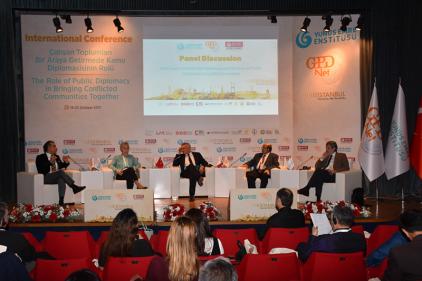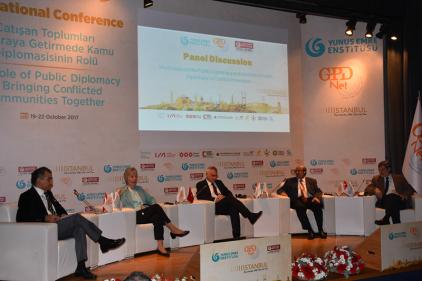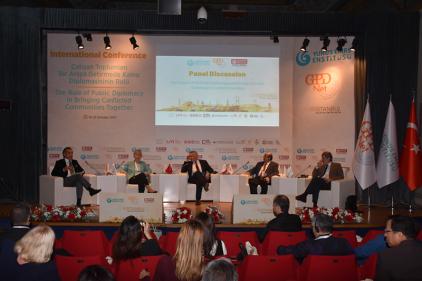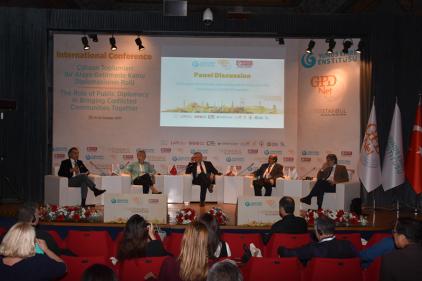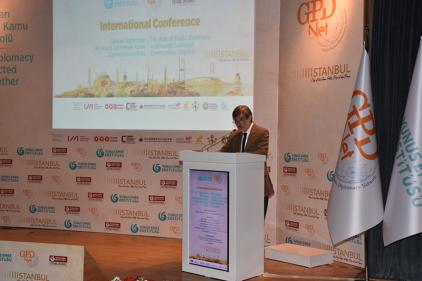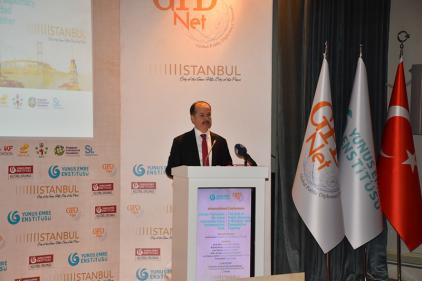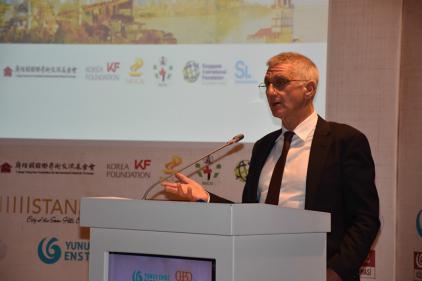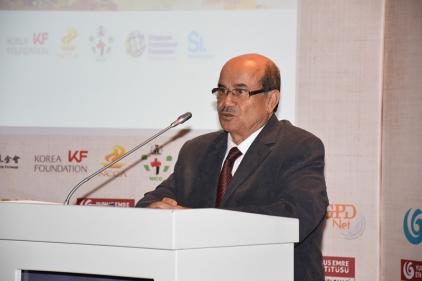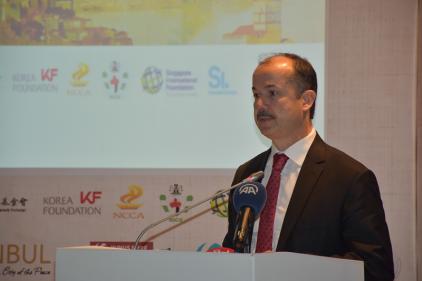Global Public Diplomacy Network Representatives Gathered in Istanbul
Yunus Emre Enstitüsü was elected as the term president of the Global Public Diplomacy Network (GPDNet) for three years in 2016 and the 4th GPDNet General Assembly took start in Istanbul. Speaking at the opening ceremony of the program that took place in the historical peninsula that hosted cultural diversities for centuries, Prof. Dr. Şeref Ateş said, "Cultural public diplomacy is essential for cultures to better understand each other in the age of communication.”
The 4th General Assembly of the Global Public Diplomacy Network (GPDNet), established in 2014 for development of bilateral and multilateral projects between countries and enables exchange of know-how in the field of public and cultural diplomacy, took start. Yunus Emre Enstitüsü is the term president representing Turkey, and the assembly took start in Istanbul on October 19th, Thursday. On the first day of the meeting attended by representatives from Sweden, Hungary, Poland, Portugal, Chinese Taiwan, Singapore, Philippines, South Korea and Nigeria, an international conference on "The Role of Public Diplomacy in Uniting Conflicting Societies" and a panel on "The Future of Public Diplomacy" were held.
Yunus Emre Enstitüsü President Prof. Dr. Şeref Ateş who spoke at the opening ceremony stated that the technology that has advanced particularly in the last 20 years in the world, influenced communication channels the most, and that the importance of intercultural communication is stronger than ever.
"Cultural diplomacy will bring peace to the world"
Expressing that culture and art establish bridges in diplomacy between countries, Prof. Dr. Şeref Ateş marked that GPDNet has undertaken an important mission in this context. Ateş stated that diplomacy has also diversified in the developing and changing world and that cultural diplomacy has become more important among traditional diplomatic channels. Expressing that as Yunus Emre Enstitüsü, they carry the culture, language of cradle of civilizations Anatolia to the world, Ateş said that they have built bridges of affection that reach four corners of the world. Addressing the work of GDPNet, Ateş spoke as follows, "GDPNet is a structure that brings together international civil initiatives, within context of information and experience exchange. GPDNet will serve a cultural diplomacy understanding that works to establish a unique garden of civilization where works produced in other regions of the world, close or far, will come together freely, instead of chaining the world with concepts that are no longer geographical but political such as Far East, Middle East and West. We have organized a number of festivals, workshops, exhibitions with the aim of creating awareness and protecting cultural heritage and strengthening the ties between countries. In this context, we also hold this first international conference today. We aim to support these efforts throughout our three years of service and to strengthen this network by increasing the number of our members to achieve an ever-expanding structure."
"The only thing that will end hate crimes is cultural diplomacy"
Within the scope of the program that deals with the cultural aspects of cohabitation through cultural diplomacy, an international conference on "The Role of Public Diplomacy in Uniting Conflicting Societies" was organized with participation of academicians and respected field experts from leading world universities as Yunus Emre Enstitüsü Cultural Diplomacy Academy was the main coordinator.
Journalist and Political Scientist Brigitte Nacos from Columbia University, made a presentation on the importance of public diplomacy in the age of global communication in the conference. Referring to Charlie Hebdo caricature crisis, Nacos said that when societies do not recognize the cultural values of one another, they do not realize the hate crimes they commit and the unspoken violence. She underlined that when cultural sensitivities are not discussed, this leads to greater conflicts, normalizing racist rhetoric and hate crimes.
One of the speakers was King's College Strategic Communication Centre Director Neville Bolt, who addressed the role of communication and importance of social media in the field of public diplomacy. Bolt expressed that knowing only one's respective culture does not suffice and people must be informed to influence their behaviours, and stated that today public diplomats have become electronic envoys that collect data.
Bolt expressed that public diplomats are people who understand the culture of their respective countries and ended his speech with a quote by Rumi: “Now it is time to tell new things.”
The conference continued with the presentations by Bekir Karlığa from Civilizations Meeting and Former Ankara Ambassador and Chile Ministry of Defence official Luis Palma Castillo.
Castillo marked that social media platforms have become tools that create awareness on social and political issues beyond connecting people and are utilized by states as well as other actors. He underlined that if public diplomats manage this tool correctly, they can make valuable contributions to the humanity.
The first day ended after the panel on “The Future of Public Diplomacy” which was broadly participated and a group photo shoot.
Anatolian Civilizations Tour Project
The first activity of the Global Public Diplomacy Network organized by Yunus Emre Enstitüsü was GPDNet Anatolian Civilizations Tour Project. Within the scope of the project, various events were held in Nevşehir, Ankara and Istanbul between October 2 and 9, 2016. Next to representatives of GPDNet, the Anatolian Civilizations Tour was participated also by prominent public diplomacy actors of member countries and senior official representatives from Turkey.
Fairy Tales for All Festival
"Fairy Tales for All Festival” organized by Global Public Diplomacy Network (GPDNet) Yunus Emre Enstitüsü is the term president of, was held in Ankara between April 20 and 22, 2017. In Fairy Tales for All Festival, countries introduced their cultures through following tales: Manic Buangsi from the Philippines, Woodsmith and Angel from South Korea, Ekineta from Nigeria, Making Peace with the Rattlesnake: Story Under the Gazebo from the Chinese Taiwan, and the Hedgehog and Black Rooster from Hungary.
On the Global Public Diplomacy Network (GPDNet)
The Global Public Diplomacy Network (GPDNet) was established by public and cultural diplomacy institutions of nine countries (Philippines, Sweden, Korea, Chinese Taiwan, Nigeria, Poland, Portugal, Singapore and Turkey) including Yunus Emre Enstitüsü from Turkey, in the capital of South Korea Seoul in 2014. With the addition of Hungary, the number of members rose to 10. GPDNet was established on October 23rd, 2014 with the aim of enabling exchange of theoretical and practical knowledge of institutions operating in the fields of cultural and public diplomacy in various regions of the world and devising bilateral and multilateral projects. Turkey is represented by Yunus Emre Enstitüsü and since 2016 Yunus Emre Enstitüsü is the term president of GPDNet.
Global Public Diplomacy Network (GPDNet) Member Countries and Affiliate Institutions:
Poland Adam Mickiewicz Institute (IAM)
Turkey Yunus Emre Enstitüsü (YEE)
Chinese Taiwan Chiang Ching-kuo Foundation (CCK)
South Korea Korea Foundation (KF)
Philippines National Commission for Culture and the Arts (NCCA)
Singapore Singapore International Foundation (SIF)
Sweden Swedish Institute (SI)
Hungary Balassi Institute (BI)
Nigeria National Institute for Cultural Orientation (NICO)
Portugal Camoes Institute (IC)

